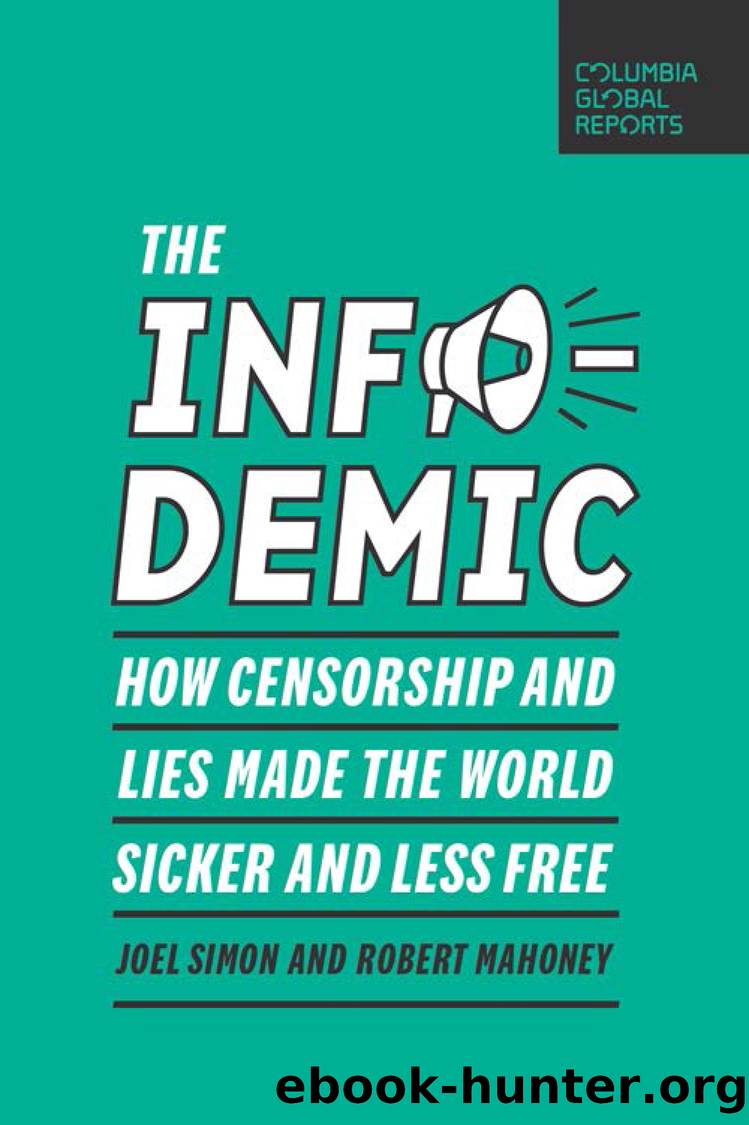The Infodemic by Joel Simon

Author:Joel Simon
Language: eng
Format: epub
Publisher: Columbia Global Reports
On February 15, 2020, before an audience of foreign policy experts at the Munich Security Conference in Germany, WHO Director General Tedros Adhanom Ghebreyesus declared, âWeâre not just fighting an epidemic. We are fighting an infodemic.â Referring to the rumors, lies, and conspiracy theories, circulating online and through the media, Tedros lamented that these spread âfaster and more easily than this virus.â
Two months later, on April 14, at a time when there were 2 million cases of COVID-19 around the world and 120,000 people had already died, UN Secretary-General António Guterres announced the creation of a special communications project to fight the scourge of misinformation. âAround the world, people are scared,â Guterres declared in a video posted to social media channels. âHarmful health advice and snake-oil solutions are proliferating. Falsehoods are filling the airwaves. Wild conspiracy theories are infecting the internet. Hatred is going viral, stigmatizing and vilifying people and groups.â
The solution, Guterres asserted, was to flood the internet with âfacts and scienceâ that would build trustâtrust in science and trust in institutions. âWith common cause for common sense and facts, we can defeat COVID-19âand build a healthier, more equitable, just, and resilient world,â Guterres concluded.
The international community, Guterres affirmed, needed to find a way to break through. Until effective treatments were developed and a vaccine rolled out, information was just about the only weapon governments had to fight the disease. Accurate, reliable, and timely information could help change personal behavior, and convince people that they needed to abide by lockdowns, maintain social distance, wash their hands, and wear masks. But Guterresâs confidence that governments would get behind such an effort was severely misplaced. In fact, from the outset, as we have seen in earlier chapters, far from fighting the infodemic, governments around the world were fueling it. They did this in two ways. First, they used propaganda networks and social media to pump out misinformation that advanced their own position or weakened an adversaryâs. Chinaâs unfounded claim that COVID-19 originated in frozen food imported into the country is one example. Governments consistently censored data about the number of COVID cases to support their contention that the threat was exaggerated. They also made wild claims about miracle cures, including hydroxychloroquine, as a way of suggesting the pandemic would soon end and therefore tough decisions on mitigation measures were unnecessary.
The additional challenge, as the experience of Charles Loftus showed, is that people make decisions based not just on the information they consume, but on the context and meaning they give to it. Group identity may be more important than an objective analysis of the facts, and this is particularly true during periods of conflict and polarization. In the United States, Trump supporters who got their information directly from the presidentâs social media or filtered through Fox News tended to believe the president not because they were irrational or unsophisticated but because their political identity shaped their perceptions of reality.
This is why during the first COVID year Americans lived in several different
Download
This site does not store any files on its server. We only index and link to content provided by other sites. Please contact the content providers to delete copyright contents if any and email us, we'll remove relevant links or contents immediately.
The Secret History by Donna Tartt(18694)
The Social Justice Warrior Handbook by Lisa De Pasquale(12069)
Thirteen Reasons Why by Jay Asher(8716)
This Is How You Lose Her by Junot Diaz(6689)
Weapons of Math Destruction by Cathy O'Neil(6068)
Zero to One by Peter Thiel(5618)
Beartown by Fredrik Backman(5533)
The Myth of the Strong Leader by Archie Brown(5358)
The Fire Next Time by James Baldwin(5185)
How Democracies Die by Steven Levitsky & Daniel Ziblatt(5083)
Promise Me, Dad by Joe Biden(5029)
Stone's Rules by Roger Stone(4981)
100 Deadly Skills by Clint Emerson(4785)
A Higher Loyalty: Truth, Lies, and Leadership by James Comey(4768)
Rise and Kill First by Ronen Bergman(4643)
Secrecy World by Jake Bernstein(4584)
The David Icke Guide to the Global Conspiracy (and how to end it) by David Icke(4539)
The Farm by Tom Rob Smith(4397)
The Doomsday Machine by Daniel Ellsberg(4366)
